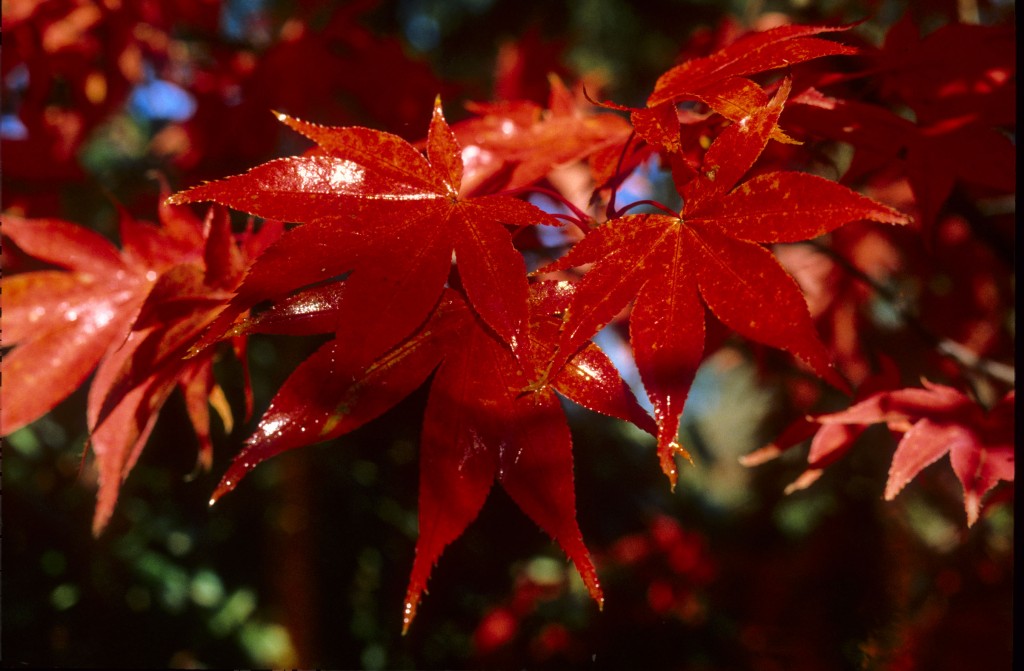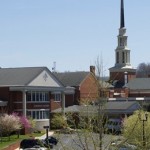The arts and craft college where I work sits on an 11-acre wooded campus in Portland’s west hills. It’s a beautiful campus, built on the site of an old filbert orchard, and it bewitches almost everyone who visits. A few years ago, the college put in two new beautiful, architecturally-significant buildings. Both buildings have been submitted for Silver LEED Certification. Unfortunately, a significant percentage of the old filbert orchard was destroyed during construction. (This was not part of the master plan.) Many faculty, staff, students, and alumni were understandably devastated at the loss of so many beautiful old trees. There is still a palpable collective grief. I am a member of an Orchard Committee that has been formed to recommend what to do with the clover field that now covers that area.
Today, some students, faculty, and staff got together to do landscaping near the college library, which included planting two new Japanese maple trees transported from the nursery that surrounds our house in Silverton. It was a joint Earth Day/Arbor Day celebration. I was asked to say a few words at a tree dedication this afternoon. I thought I would post my brief remarks here, since they touch on the Slow Church theme of good work, as well as on the conversation taking place on this blog about the standards of health and flourishing. I have edited my remarks very slightly for clarity.
****
April is National Poetry Month and today, April 26, is Poem in Your Pocket Day, a day when the Academy of American Poets encourages Americans to carry a favorite poem in their pocket, to read throughout the day and to share with friends and family and co-workers.
The poem in my pocket is by Wendell Berry. It’s called “Manifesto: The Mad Farmer Liberation Front.” As an essayist, novelist, poet, activist, and farmer, Berry has been brilliantly working the same plot of Kentucky hillside for more than 50 years. Writers like Michael Pollan and Bill McKibben look to Berry as a mentor, and earlier this week Berry gave the National Endowment for the Humanities Jefferson Lecture, the highest honor the federal government bestows for distinguished intellectual and public achievement in the humanities.
In “Manifesto,” Berry writes, “So, friends, every day do something / that won’t compute.” And then later:
As soon as the generals and the politicos
can predict the motions of your mind,
lose it. Leave it as a sign
to mark the false trail, the way
you didn’t go.
Be like the fox
who makes more tracks than necessary,
some in the wrong direction.
These seem like notions that are likely to resonate on the campus of an arts college.
“Manifesto” is my favorite poem, and it’s a pleasant coincidence that I’m keeping it in my pocket today because there are a couple lines in the poem that seem especially appropriate for this occasion. Berry writes: “Invest in the millennium. Plant sequoias. …// Put your faith in the two inches of humus / that will build under the trees / every thousand years.”
To me these lines are about taking the long view, about the importance of resisting the tyranny of the urgent over the important. They also make me think about what it means to do “good work.” Planting sequoias means starting good work we won’t see the end of. It means doing that good work with fidelity, humility, discipline, and even a kind of reverence, judging our work not by the goals of the quick profit or unrestrained growth, but by the standards of flourishing.
This cultivar of Japanese maple, called osakazuki, should reach its mature height in another fifteen years; tended with care, it may live a century or more. Planting the trees here means that we have gathered them into our community, as we will be gathered into theirs. Our fates are bound up with the fates of these trees. We are making a commitment to each other. We’re also making a commitment to the land, to our neighbors, and to the next five or six generations of OCAC students. My grandchild’s grandchild may one day draw inspiration from the canopy of this tree.
Planting these trees causes me to reflect appreciatively on the faculty, staff, alumni, donors, and other longtime friends of the college. These are people who have devoted so much of themselves to the college: its students, its community, the institution, the art making that happens here, this place.
Some of our faculty members have been here for decades. That famous quote from Henry Adams comes to mind: “A teacher affects eternity; he can never tell where his influence stops.” Those of us on staff all play a vital role in making that eternal work happen, meaning we are affecting eternity too.
I want to use this tree dedication to honor Reneé’s and Mark’s dedication to the school. [Reneé is part of the front desk staff at the college, and she is an Oregon State University Master Gardener. Mark is the groundskeeper. Both are members of the Orchard Committee.] Visitors love the campus, which has been shaped in large and small ways by Reneé’s vision and by Mark’s 35 years of loyalty and care. Mark has started good work he won’t see the end of.
Several of us have only been at the college for a short time. For however long we’re here, I hope we can be inspired by their example, put down roots, and do lasting good. The poet Gary Snyder says, “Find your place on the planet. Dig in, and take responsibility from there.”
I’d like to close by reading one more poem by Wendell Berry. I chose it, in part, because it honors the memory of the old filbert orchard. It honors the legitimate grief felt by many in the college community over the loss of the orchard, while moving hopefully into the future. The poem is called, appropriately, “Planting Trees.”
In the mating of trees,
the pollen grain entering invisible
the domed room of the winds, survives
the ghost of the old forest
that stood here when we came. The ground
invites it, and it will not be gone.
I become the familiar of that ghost
and its ally, carrying in a bucket
twenty trees smaller than weeds,
and I plant them along the way
of the departure of the ancient host.
I return to the ground its original music.
It will rise out of the horizon
of the grass, and over the heads
of the weeds, and it will rise over
the horizon of men’s heads. As I age
in the world it will rise and spread,
and be for this place horizon
and orison, the voice of its winds.
I have made myself a dream to dream
of its rising, that has gentled my nights.
Let me desire and wish well the life
these trees may live when I
no longer rise in the mornings
to be pleased by the green of them
shining, and their shadows on the ground,
and the sound of the wind in them.













